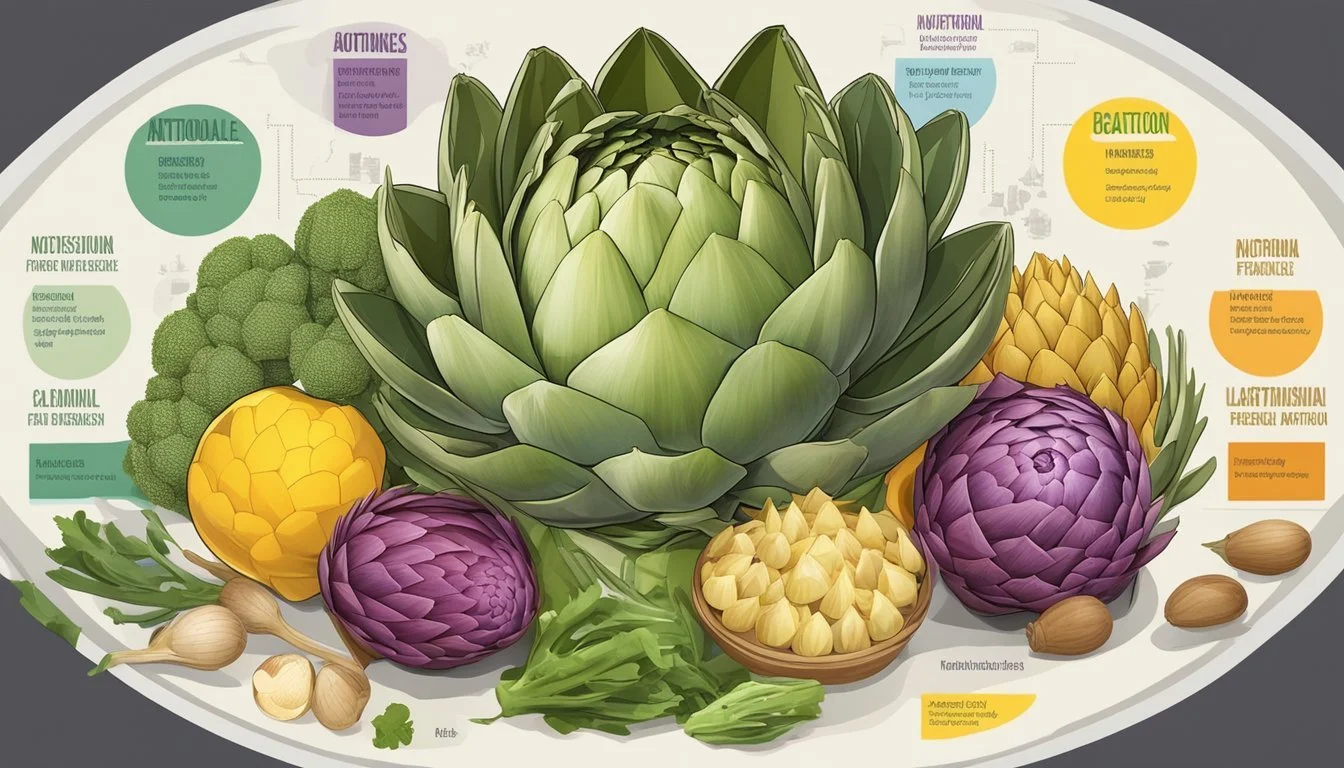What Are the Health Benefits of Artichokes?
Unveiling Nutritional Values
Artichokes are a versatile vegetable known for their distinctive taste and numerous health benefits. With their origin tracing back to the Mediterranean region, these globular plants are part of the thistle family and have been cultivated for centuries. Nutritionally dense, artichokes are a source of essential vitamins and minerals with a low calorie and fat content, making them an excellent addition to a health-conscious diet.
The health benefits of artichokes are wide-ranging. They are rich in antioxidants, compounds that help protect the body's cells from damage by free radicals. This vegetable is also noted for its positive impact on heart health, attributed to its fiber content and the presence of compounds like cynarin and silymarin. These substances have been associated with improved blood flow and lower levels of bad cholesterol, both of which can contribute to reduced risks of heart disease.
Additionally, artichokes have been acknowledged for their potential to support digestion and liver health. The high fiber content can aid in maintaining a robust digestive system, preventing issues such as constipation and supporting overall gut health. The natural compounds found in artichokes may also promote liver function, assisting in the production and elimination of bile, which helps remove toxins and digest fats more efficiently.
Nutritional Profile of Artichokes
Artichokes are a rich source of various nutrients that play an essential role in maintaining good health. They provide a balance of macronutrients and are an excellent source of dietary fiber and essential vitamins and minerals.
Macronutrients and Fiber
A medium-sized artichoke offers approximately 64 calories, primarily from carbohydrates, with 14.4 grams per serving. Artichokes contain a moderate amount of protein, with 3.5 grams per medium-sized artichoke, and are low in fat, providing only 0.4 grams. Notably, they are high in dietary fiber, around 10 grams per artichoke, which aids in digestion and can help in managing blood sugar levels.
Vitamins and Minerals
Artichokes are an abundant source of essential vitamins and minerals. They are rich in:
Vitamin C: important for immune function and skin health.
Vitamin K: necessary for blood clotting and bone health.
Folate (B9): critical for cell division and proper fetal development.
Potassium: crucial for muscle function and maintaining a healthy blood pressure.
Magnesium: involved in over 300 biochemical reactions in the body.
Calcium: essential for bone health.
Iron: important for oxygen transport in the blood.
Phosphorus: helps in the formation of bones and teeth.
Niacin (B3): supports energy metabolism and nervous system function.
Manganese: plays a role in bone formation and nutrient metabolism.
Artichokes are also a source of inulin, a type of prebiotic fiber, contributing to gut health by promoting beneficial gut bacteria.
Health Benefits
Artichokes are a rich source of antioxidants and fiber, indicating potential benefits across various aspects of health, particularly in cardiovascular and digestive systems. They are also associated with liver health enhancement and blood sugar regulation.
Cardiovascular Health
Artichokes contribute to heart health through their high content of antioxidants, which can help reduce oxidative stress on the heart. They also have a positive effect on cholesterol levels; the leaves contain compounds that may lower bad LDL cholesterol and increase good HDL cholesterol, potentially reducing the risk of heart disease. Furthermore, fiber from artichokes may assist in blood pressure regulation, thereby mitigating the risk of stroke.
Digestive Health
The high fiber content in artichokes is crucial for maintaining digestive health. It can alleviate constipation and improve overall bowel function. Additionally, artichokes act as a prebiotic, feeding the beneficial bacteria in the gut. They may also reduce inflammation and symptoms of irritable bowel syndrome.
Liver Function and Detoxification
Artichokes contain cynarin and silymarin, compounds known to have a beneficial effect on liver function. These substances can stimulate bile production, which not only aids in digestion but also supports the liver in its detoxification processes, helping to cleanse the liver and improve its overall health.
Blood Sugar Regulation
Regular consumption of artichokes might help in the regulation of blood sugar levels, benefitting individuals with diabetes. The fiber in artichokes helps to slow down glucose absorption, preventing spikes in blood sugar, which is crucial for the stable management of diabetes.
Cancer Risk Reduction
The antioxidants found in artichokes, such as rutin, quercetin, and gallic acid, contribute to the reduction of cancer risk by neutralizing harmful free radicals. Further studies are needed to fully confirm the extent to which artichokes can impact the incidence of cancer, but their high antioxidant content suggests a potential benefit in cancer risk reduction.
Culinary Uses of Artichokes
Artichokes, available in fresh, canned, frozen, and jarred forms, offer versatility in the kitchen. They are used in a variety of dishes ranging from dips to main courses, making them a valuable ingredient for any chef.
Preparing Artichokes
To prepare fresh artichokes, one must trim the stem and remove the tough outer leaves. The remaining petals can be steamed until tender—an ideal method for preserving their nutrients and flavors. Steamed artichokes can be served whole as a side dish, often accompanied by butter or a variety of herbs for dipping.
For those who prefer a quicker option, canned, frozen, or jarred artichokes are readily available and can be used directly in recipes. These pre-prepared artichokes are particularly convenient for incorporating into dishes without the additional preparation time.
Recipe Ideas
Salads: Artichokes can be added to salads for an extra layer of texture and flavor. Both fresh and canned artichokes work well in salads, with the latter being a time-saving option.
Pasta and Risotto: Both the petals and the heart of the artichoke can be incorporated into pasta dishes or risotto, offering a unique taste and creamy texture.
Side Dishes: Combine artichoke hearts with vegetables such as spinach to create a delectable side dish or incorporate them into a savory dip.
Soups and Stews: The robust flavor of artichokes enriches soups and stews. When used in soups, they provide a mild, nutty flavor that complements other ingredients.
Artichoke leaves, stem, and heart can be utilized in various culinary applications. They can be paired with different herbs to add depth to the dish's flavor profile.
Selection and Storage
When selecting and storing artichokes, one must consider the peak season, optimal freshness, and appropriate storage methods to maintain taste and quality.
Choosing Fresh Artichokes
Season: The peak season for artichokes, particularly the globe artichoke, is spring and again in a smaller harvest in early fall. During this time, they are most abundant, especially in California, which is a leading producer in the United States.
Appearance: Look for artichokes with tight, compact leaves and a deep green color. The leaves should "squeak" when they are pressed together, indicating freshness. Avoid artichokes that appear dry or have split leaves.
Varieties: There are several varieties of artichokes, including the common globe artichoke. The specific variety can affect the taste and texture, so it's best to try different types and choose based on personal preference.
Storing Artichokes
Refrigeration: To prolong the freshness of artichokes, they should be stored in the refrigerator. Use a plastic bag to help retain humidity, but make sure it's not airtight as slight airflow can prevent condensation.
Timeframe: Fresh artichokes can last up to a week when stored properly in the fridge. The sooner they are used after purchasing, the better, as they will retain optimal taste and texture.
USDA Guidelines: Follow USDA storage guidelines to ensure the artichokes maintain quality and are safe to eat. Generally, keeping artichokes cold will slow down the deterioration process inherent in all produce.
Frequently Asked Questions
Artichokes are a versatile vegetable rich in nutrients and associated with multiple health benefits ranging from liver support to skin health improvement.
What specific nutrients in artichoke leaves contribute to their health benefits?
Artichoke leaves are rich in compounds such as cynarin and silymarin, which are known for their antioxidant and liver-protective properties. They also contain inulin, a type of dietary fiber that supports digestive health.
Can consuming artichokes improve skin health, and if so, how?
Artichokes are high in antioxidants, including vitamin C and flavonoids, which contribute to skin health by supporting collagen production and protecting the skin from damage caused by free radicals.
How does artichoke consumption affect liver function?
The cynarin and silymarin found in artichokes enhance liver function by promoting the growth and regeneration of liver cells and protecting the liver from toxins.
What advantages might artichoke supplements offer compared to whole artichokes?
Artichoke supplements may provide a more concentrated source of the active compounds found in artichokes, such as cynarin, making them a convenient alternative for supporting digestion and liver health.
In what ways are artichokes considered beneficial as a part of a daily diet?
Artichokes are a fibrous, nutrient-dense food. They are low in fat and high in fiber, folate, vitamins C and K, and minerals like magnesium and potassium, making them a beneficial addition to a daily diet for overall health.
What are the potential health benefits of including marinated artichoke hearts in your meals?
Marinated artichoke hearts contain healthy fats from the oil used in the marinating process, and when combined with the natural nutrients of artichokes, they can contribute to heart health and provide anti-inflammatory benefits.





